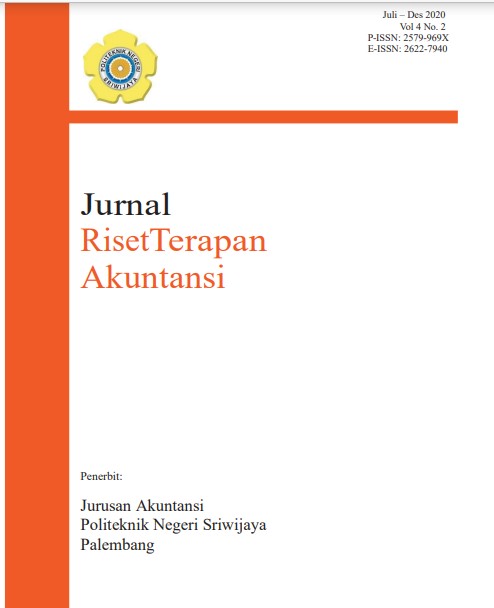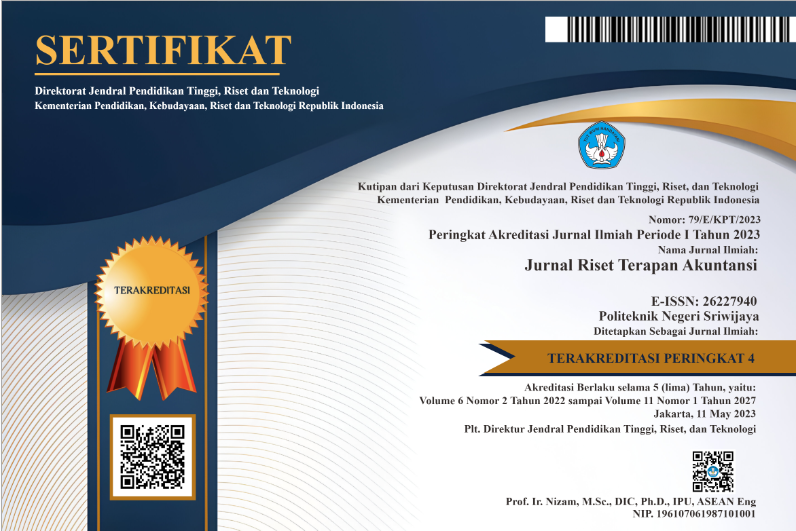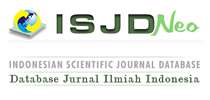Pengaruh Corporate Governance Terhadap Earnings Management Pada Perusahaan Manufaktur Di Bursa Efek Indonesia
DOI:
https://doi.org/10.5281/zenodo.4277501Keywords:
Corporate governance, earnings management, dan variabel kontrol.Abstract
AbstrakPenelitian ini bertujuan untuk menguji pengaruh corporate governance yang diproksi variabel institutional ownership, board size, dan board independent terhadap earnings management. Penelitian ini dilakukan terhadap 295 perusahaan manufaktur yang secara terus-menerus tercatat di Bursa Efek Indonesia periode tahun 2014-2018. Metode analisis data menggunakan Ordinary Least Square (OLS) yang diproses dengan bantuan Aplikasi Wrap-PLS 6.0. Hasil penelitian ini menunjukkan bahwa corporate governance yang diproksi dengan variabel institutional ownership secara signifikan berpengaruh negatif terhadap earnings management, dan board size secara signifikan berpengaruh positif. Penelitian ini tidak dapat membuktikan bahwa board independent secara signifikan memiliki pengaruh terhadap earnings management. Selanjutnya, variabel kontrol firm size dan financial leverage menunjukkan pengaruh yang positif dan signifikan terhadap earnings management, sedangkan profitability tidak signifikan pengaruhnya terhadap earnings management.
Kata kunci: Corporate governance, earnings management, dan variabel kontrol.
Â
Abstract
This study aims to examine the effect of corporate governance as proxied by institutional ownership, board size, and independent board variables on earnings management. This research was conducted on 295 manufacturing companies that are continuously listed on the Indonesia Stock Exchange for the period 2014-2018. The data analysis method uses OLS (Ordinary Least Square) which is supported by the Wrap-PLS 6.0 application. The results of this study indicate that corporate governance which is proxied by institutional ownership has a significant negative effect on earnings management, and board size has a significant positive effect. This study cannot prove that the independent board has an influence on earnings management. Furthermore, the control variables of firm size and financial leverage show a positive and significant effect on earnings management, while profitability has no significant effect on earnings management.
Keywords: Corporate governance, earnings management, and control variables.References
Abed, S., Al-Attar, A., & Suwaidan, M. (2011). Corporate Governance and Earnings Management: Jordanian Evidence. International Business Research, 5(1), 216–
225. https://doi.org/10.5539/ibr.v5n1p216
Agnes Cheng, C. S., & Reitenga, A. (2009). Characteristics of institutional investors and discretionary accruals. International Journal of Accounting & Information Management, 17(1), 5–26. https://doi.org/10.1108/18347640910967717
Al-fayoumi, N., Abuzayed, B., & Alexander, D. (2010). Ownership Structure and Earnings Management in Emerging Markets : The Case of Jordan. (April).
Alareeni, B. (2018). The impact of firm-specific characteristics on earnings management: evidence from GCC countries. International Journal of Managerial and Financial Accounting, 10(2), 85.
https://doi.org/10.1504/ijmfa.2018.10012808
Ali, U., Noor, M., Khurshid, M. K., & Mahmood, A. (2015). Impact of Firm Size on
Earnings Management: A Study of Textile Sector of Pakistan. SSRN Electronic Journal, 7(28), 47–56. https://doi.org/10.2139/ssrn.2698317
Amihud, Y., Kamin, J. Y., & Ronen, J. (1983). “MANAGERIALISMâ€, “OWNERISM†AND RISK Yakov AMIHUD. New York, 7.
Anderson, R. C., Mansi, S. A., & Reeb, D. M. (2003). Founding family ownership and the agency cost of debt. Journal of Financial Economics, 68(2), 263–285. https://doi.org/10.1016/S0304-405X(03)00067-9
Anglin, P., Edelstein, R., Gao, Y., & Tsang, D. (2013). What is the Relationship Between REIT Governance and Earnings Management? Journal of Real Estate Finance and Economics, 47(3), 538–563. https://doi.org/10.1007/s11146-012- 9367-y
Aygun, M., Ic, S., & Sayim, M. (2014). The Effects of Corporate Ownership Structure and Board Size on Earnings Management: Evidence from Turkey. International Journal of Business and Management, 9(12), 123–132. https://doi.org/10.5539/ijbm.v9n12p123
Azoury, N., Jreitiny, R., & Azzi, G. (2015). The relationship between corporate governance structure and family firms’ performance. EuroMed J. of Management, 1(1), 2. https://doi.org/10.1504/emjm.2015.072547
Bar-Yosef, S., & Prencipe, A. (2013). The impact of corporate governance and earnings management on stock market liquidity in a highly concentrated ownership capital market. Journal of Accounting, Auditing and Finance, 28(3), 292–316. https://doi.org/10.1177/0148558X13492591
Bassiouny, S. W. (2016). The impact of firm characteristics on earnings management: an empirical study on the listed firms in Egypt. Journal of Business and Retail Management Research (JBRMR), 10(34–45), 85. https://doi.org/10.1504/ijmfa.2018.10012808
Callao, S., & Jarne, J. I. (2010). Have IFRS affected earnings management in the European Union? Accounting in Europe, 7(2), 159–189. https://doi.org/10.1080/17449480.2010.511896
Chung, R., Firth, M., & Kim, J. (2002). Institutional monitoring and opportunistic earnings management. 8, 29–48.
Davidson, R., Goodwin-Stewart, J., & Kent, P. (2005). Internal governance structures and earnings management. Accounting and Finance, 45(2), 241–267. https://doi.org/10.1111/j.1467-629x.2004.00132.x
Demsetz, H., & Lehn, K. (2009). The structure of corporate ownership: Causes and consequences. Readings in Applied Microeconomics: The Power of the Market, 93(6), 383–401. https://doi.org/10.4324/9780203878460
Detthamrong, U., Chancharat, N., & Vithessonthi, C. (2017). Corporate governance, capital structure and firm performance: Evidence from Thailand. Research in International Business and Finance, 42(July), 689–709. https://doi.org/10.1016/j.ribaf.2017.07.011
Dhaliwal, D. S., Salamon, G. L., & Smith, E. D. (1982). 2 . Ownership control status and choice of accounting methods : Theory and prior evidence. New York, 4, 41–53.
Emamgholipour, M., Maryam, S., Bagheri, B., Mansourinia, E., & Arabi, M. (2013). Management Science Letters. 3, 1105–1112. https://doi.org/10.5267/j.msl.2013.03.017
Geraldes Alves, S. M. (2011). The effect of the board structure on earnings management: evidence from Portugal. Journal of Financial Reporting and
Accounting, 9(2), 141–160. https://doi.org/10.1108/19852511111173103 Ghosh, A., Marra, A., & Moon, D. (2010). Corporate Boards, Audit Committees, and
Earnings Management: Pre- and Post-SOX Evidence. Journal of Business Finance and Accounting, 37(9–10), 1145–1176. https://doi.org/10.1111/j.1468- 5957.2010.02218.x
Iturriaga, F. J. L., & Hoffmann, P. S. (2005). Earnings Management and Internal Mechanisms of Corporate Governance: Empirical Evidence From Chilean Firms. Corporate Ownership and Control, 3(1). https://doi.org/10.22495/cocv3i1p2
Jensen, M. C. (1986). Agency costs of free cash flow, corporate finance, and takeovers. American Economic Association, 76(2), 323–329. https://doi.org/10.1017/cbo9780511609435.005
Jensen, M. C. (1994). The Modern Industrial Revolution, Exit, and the Failure of Internal Control Systems. Journal of Applied Corporate Finance, 6(4), 4–23.
Jensen, M. C., & Meckling, W. H. (1976). Theory of the firm: Managerial behavior, agency costs and ownership structure. Journal of Financial Economics, 3(4). https://doi.org/10.1016/0304-405X(76)90026-X
Jin, J. Y. (2013). Investor attention and earnings management around the world.
Accounting Perspectives, 12(2), 165–187. https://doi.org/10.1111/1911-
3838.12013
Jouber, H., & Fakhfakh, H. (2011). Article information :
Koh, P. S. (2003). On the association between institutional ownership and aggressive corporate earnings management in Australia. British Accounting Review, 35(2), 105–128. https://doi.org/10.1016/S0890-8389(03)00014-3
Lanouar, C., Riahi, R., & Omri, A. (2013). The Determinants of Earnings Management in Developing Countries: A Study in the Tunisian Context. The IUP Journal of Corporate Governance, (1), 35–49.
Loderer, C., & Peyer, U. (2002). Board overlap, seat accumulation and share prices. European Financial Management, 8(2), 165–192. https://doi.org/10.1111/1468- 036X.00183
Macey, J. (1998). Measuring the Effectiveness of Different Corporate Governance Systems: Toward a More Scientific Approach.
Marra, A., Mazzola, P., & Prencipe, A. (2011). Board monitoring and earnings management pre- and post-IFRS. International Journal of Accounting, 46(2), 205–230. https://doi.org/10.1016/j.intacc.2011.04.007
Mohd Ali, S., Mohd Salleh, N., & Hassan, M. S. (2008). Ownership structure and earnings management in Malaysian listed companies: The size effect. Asian Journal of Business and Accounting, 1(2), 89–116.
Nikoomaram, H., Banimahd, B., & Shokri, A. (2012). An Empirical Analysis of Earnings Management Motives in Firms Listed on Tehran Stock Exchange. Journal of Basic and Applied Scientific Research, 2(10), 9990–9993.
Park, Y. W., & Shin, H. H. (2004). Board composition and earnings management in Canada. Journal of Corporate Finance, 10(3), 431–457. https://doi.org/10.1016/S0929-1199(03)00025-7
Rahman, R. A., & Mohamed Ali, F. H. (2006). Board, audit committee, culture and earnings management: Malaysian evidence. Managerial Auditing Journal, 21(7), 783–804. https://doi.org/10.1108/02686900610680549
Sáenz González, J., & GarcÃa-Meca, E. (2014). Does Corporate Governance Influence Earnings Management in Latin American Markets? Journal of
Business Ethics, 121(3), 419–440. https://doi.org/10.1007/s10551-013-1700-8 San Martin-Reyna, J. M., & Duran-Encalada, J. A. (2012). The relationship among
family business, corporate governance and firm performance: Evidence from the Mexican stock exchange. Journal of Family Business Strategy, 3(2), 106– 117. https://doi.org/10.1016/j.jfbs.2012.03.001
San Martin Reyna, J. M. (2018). The effect of ownership composition on earnings management: evidence for the Mexican stock exchange. Journal of Economics, Finance and Administrative Science, 23(46), 289–305. https://doi.org/10.1108/JEFAS-01-2017-0011
Shleifer, A., & Vishny, R. W. (2013). Large Shareholders and Corporate Control.
94(3), 461–488.
Siam, Y. I. S. A., Laili, N. H. B., & Khairi, K. F. Bin. (2014). Board of directors and earnings management among Jordanian listed companies: Proposing conceptual framework. International Journal of Technical Research and Application, 2(3), 1–7.
Talbi, D., Ali Omri, M., Guesmi, K., & Ftiti, Z. (2015). The role of board characteristics in mitigating management opportunism: The case of real earnings management. Journal of Applied Business Research, 31(2), 661–674. https://doi.org/10.19030/jabr.v31i2.9147
Uwuigbe, U., Ranti, U. O., & Bernard, O. (2015). Assessment of the Effects of Firms Characteristics on Earnings Management of Listed Firms in Nigeria. Asian Economic and Financial Review, 5(2), 218–228. https://doi.org/10.18488/journal.aefr/2015.5.2/102.2.218.228
Yang, C., Lai, H., & Tan, B. L. (2004). Managerial Ownership Structure and Earnings Management. (1989), 35–53.
Yermack, D. (1996). Higher market valuation of companies with a small board of directors. Journal of Financial Economics, 40(2), 185–211. https://doi.org/10.1016/0304-405X(95)00844-5















